Starfield Review – Small Step for Mankind
Perusing the early impressions of Starfield, I noticed the absence of serious attempts to compare it with Mass Effect. As if many esteemed colleagues were mesmerized by the radiant hype surrounding Bethesda’s first fresh IP in a quarter of a century, neglecting the possibility of witnessing something good but profoundly derivative. The potential valid reason for not looking into the interstellar IP belonging to someone else might be Bethesda’s own pool of games. Oblivion, Skyrim, and Fallout 4 share much of their design DNA with Starfield. Why look elsewhere? It’s easy to pinpoint repeating patterns between those games almost as if we are dealing with an ancient placeholder framework that receives different thematic treatment every half a decade or so.
But the comparison with Mass Effect is inescapable. The mysterious galactic artifacts, the chosen one who receives visions by touching them, the vast, explorable galaxy brimming with opportunities, and a spaceship full of potential romantic conquests… Starfield lacks reptile-headed alien races with political agendas, being low sci-fi akin to The Expanse, but the rest of the setup is remarkably similar. This sandbox RPG shooter doesn’t try to reinvent the wheel, no matter how aggressively the advertising states the opposite. Ask the average fan if he wants a Skyrim in space and you’ll get a screaming YOU BET.
Protean Beacon
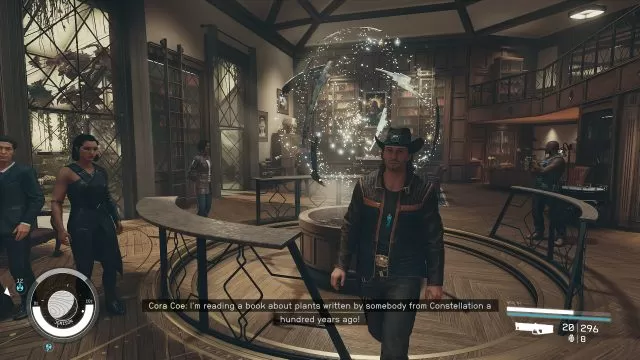
Starfield has an okay-ish sci-fi plot that is easy to follow despite the light dabbling into the nature of the universe. Or rather, the multiverse. The game has you chasing the alien artifacts on behalf of Constellation, a kind of League of Extraordinary Gentlemen of the XXIV century. After the invention of Grav Drive, Humanity had spread all over the galaxy, colonizing the part of the Milky Way that became “Settled Systems”. There’s a factional friction between central and outer worlds, but since Humanity never encountered intelligent life, people continued to exclusively screw one another. A good “story so far” recap is available on Bethesda’s website, but you can go raw without really missing anything.
The core story, however, is not the best part of the game. Optional quest lines take the galactic cake from the main plot, and some of those can drastically change how you perceive the game. For example, Ryujin Industries questline is pure Deus Ex. Taking place mostly in Neon, a cyberpunk-ish city in the semi-lawless part of the galaxy, you’ll engage in corporate espionage, infiltration, and clandestine business practices. Another quest will have you help the crew of the generation ship that only recently reached the Settled Systems after 200 years in the void.
Everyone’s early favorite is the Mantis quest, where you’ll brave the vault of legendary crime fighter. The original Mantis had set up a series of challenges designed to determine the worthy successor, preferring her biological son for that role. The lad failed, but you can pick up the pieces, along with a superior ship and the best armor in the game. Really good stuff, this.
Probing Uranus
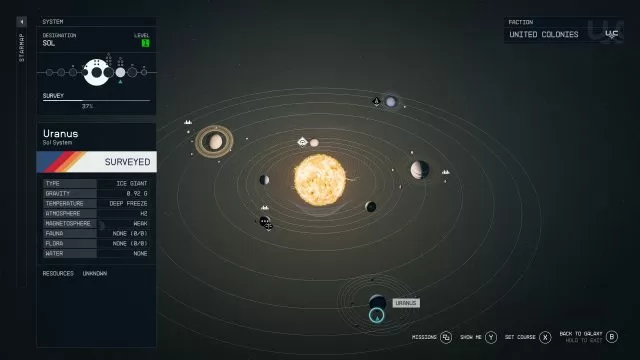
Bethesda’s sandbox wouldn’t be complete without the optional extras designed to waste your time. Think about the idea behind Fallout 4 settlements, but dialed to eleven. Surveying the planets on foot, using a hand-held scanner to probe flora, fauna, and minerals is completely unnecessary. And monotonous. Planetary exploration was much hyped before the launch, with people led to believe that it would resemble No Man’s Sky. It’s technically more primitive, with artificial zonal boundaries and copy/paste industrial or scientific installations. Settled Systems have more than 1,000 planets and celestial bodies, but most of them aren’t worth visiting.
Another redundant part of Starfield is building and staffing outposts. Technically, you can use those to farm resources, manufacture stuff, or make your dream home among the stars, but they are not essential for progress. I guess you could use the resources for researching stuff such as weapon mods, especially as the later tiers get expensive, but most of the stuff you can buy, steal, or liberate.
The only LEGO-like element in the game that clicked with me was starship customization. Modifying the ships and turning them into popular sci-fi icons became an instant sensation among early players. Endless streams of Millenium Falcon, X-Wing, and Serenity lookalikes flooded Reddit and X. The interface for doing that is not particularly user-friendly though, and you can expect module restrictions related to the skill tree. You’ll need to unlock both piloting and ship customization trees to gain access to everything.
Launch that interface into a black hole
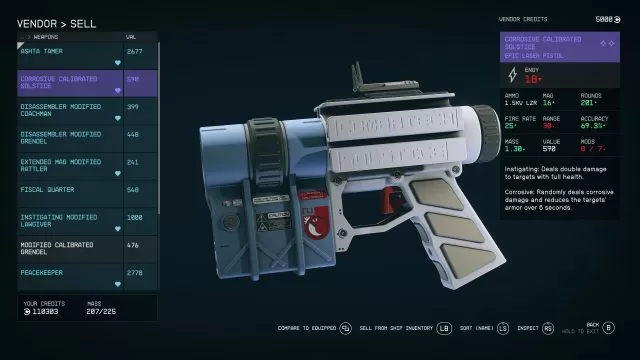
When talking about Starfield, the interface is the biggest elephant in the room. It’s abysmal across the board. Every aspect of the game, from interstellar navigation to loot management, requires deep-diving into a counter-intuitive menu system. Navigating the star map, flying to the destination, and picking the landing spot on the planet requires back-and-forth surfing through the menus and the map. The only user-friendly option is quest-related fast travel you can “ergonomize” with two or three clicks. Also, star and settlement maps are not searchable, which can present major problems if you wish to return somewhere without a quest marker to guide you.
Staying in the flaw zone, I would like to point out the inadequacy of the cast. Maybe I’m spoiled after more than eighty hours of Baldur’s Gate 3, but the companions and their stories in Starfield aren’t nearly as good. They just aren’t very interesting, no two ways about that. Worse, the main character is practically a non-entity who works as a mirror to other NPC-a. You can clearly see what I’m talking about in the semi-randomized persuasion checks. Half of those are repeating, meaningless placeholders, written as a narrative filler.
Probably the best part
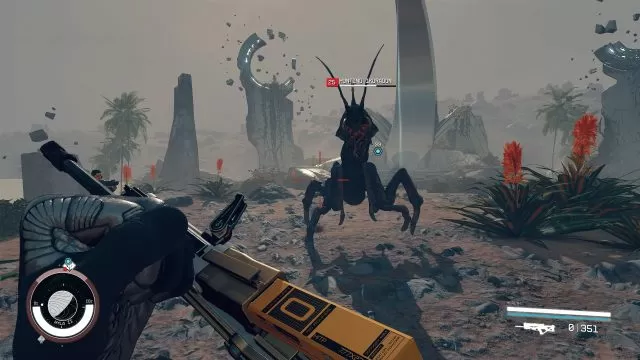
Much of the game’s deficiencies are compensated by the raw intensity of the action. Gunplay is easily the best element here, with a myriad of moddable weapons suited for every play style. The level discrepancy between you and your foes doesn’t matter much, mainly because you can spam health items indiscriminately. Provided you have them, of course. You can further enhance your combat prowess via talents for every weapon group, and the same goes for the weapons on your ship.
Space combat is a simple but straightforward affair. Besides the elementary energy management system, you only need to worry about your shield strength and hull HP. The former is effortlessly patched on the fly with spare parts, so success in battle is mostly related to the ample supply of those. Same as in ground combat, stuffed inventory wins the day (most of the time).
Absence of creative risks
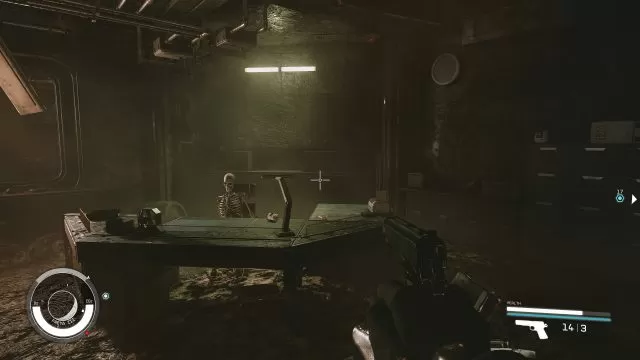
No matter how big and content-rich the game is, the feeling of massive deja vu is unavoidable. Bethesda seems genuinely proud about the fact that they launched a new IP after 29 years. They actively communicate it. But they simply refused to take any creative risks with it. The cynic might say that they at least didn’t turn their sandbox formula into a live service monstrosity, but that’s a lousy consolation for someone expecting a genuine revelation.
Starfield is a handsomely produced game with the bona fide capacity to engage and entertain, especially for the young people who don’t know any better. If your mileage is higher than average, however, you’ll easily deduct just how naked is the new emperor. Starfield might be the hot new IP for the XXI century, but for the players from the tail-end of the last one, it’s just another sci-fi game with Credits as the galactic currency. Mass Effect had Credits. And Reapers, Liara T’Soni and Garrus Vakarian. Starfield doesn’t.
Highs
- Vast sci-fi sandbox with tons of optional content.
- Very competent gunplay.
- Ship customization is supremely fun.
- Some side quests are incredibly good.
Lows
- The core story and characters are not very engaging.
- Abysmal interface bordering on cruel joke in some respects.
- Some significant bugs in the launch version.
- Starfield is a king of content, but at least half of it is a meaningless waste of time.

